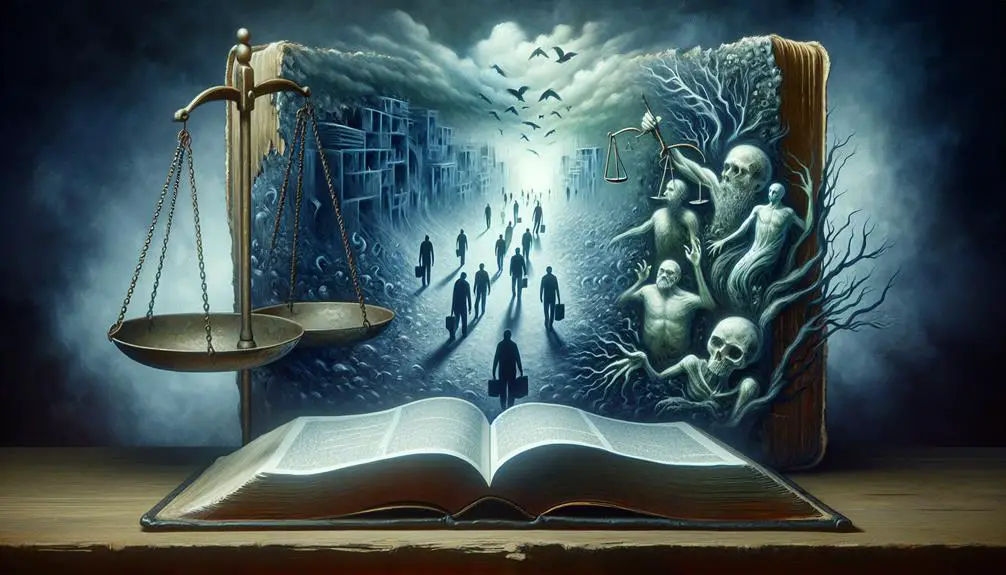From Genesis to Revelation, discover the complex role of lawlessness in biblical narratives, unveiling its impact on faith and morality.

Lawless Meaning in the Bible
In the vast sea of biblical narratives, the concept of lawlessness towers like a colossal, enigmatic giant, challenging your every notion of order and morality. You've encountered this term, scattered across the pages from Genesis to Revelation, but have you ever paused to ponder its profound significance?
It's a journey that takes you through the tumultuous tales of the prophets, the teachings of Jesus, and the stern warnings of Paul, all converging on the mysterious figure of the Antichrist. As you stand at the threshold of this exploration, you'll find yourself on the brink of uncovering how lawlessness weaves through the fabric of biblical teachings and what it ultimately means for your understanding of faith and morality.
Key Takeaways
- Lawlessness in the Bible symbolizes defiance against God's commandments, leading to moral and social decay.
- Biblical figures like Jesus and Paul highlight the spiritual consequences of rejecting divine laws, urging repentance and faith.
- The concept of lawlessness extends beyond legal transgressions, emphasizing a heart-led obedience to divine principles.
- The Bible portrays the antichrist as the pinnacle of lawlessness, warning of societal chaos and spiritual disorientation in its wake.
The Genesis of Lawlessness

In examining the concept of lawlessness within the biblical narrative, one finds its roots intertwined with the earliest acts of defiance against divine commandment. This initial rebellion sets the stage for a thematic exploration of anarchic roots that permeate the scriptures. You observe that from the onset, the biblical story presents an inherent tension between divine order and human disobedience, signifying the inception of moral decay.
As you delve deeper, it becomes apparent that lawlessness isn't merely about the absence of laws but reflects a profound departure from established moral and divine guidelines. This departure, underscored by actions that contravene God's will, illustrates an erosion of ethical and spiritual integrity. The narratives of Adam and Eve, Cain, and the builders of Babel, among others, serve as archetypal examples of this moral decay. Each story highlights a pivotal moment where individuals choose personal desire or ambition over obedience to divine directives, thereby sowing the seeds of chaos and disorder.
These episodes not only underscore the anarchic roots of lawlessness but also set a precedent for understanding the complexities of human nature and morality. They invite you to reflect on the consequences of disregarding divine authority, marking the genesis of lawlessness as a central theme in the unfolding biblical drama.
Lawlessness in the Prophets

Moving beyond the foundational narratives, you'll find that the prophets further explore the theme of lawlessness, highlighting its profound impact on society and divine relationships. The prophetic books are replete with warnings about the consequences of abandoning divine laws. These prophets, acting as divine messengers, were tasked with calling the people back to righteousness amidst a backdrop of societal decay. Their messages weren't just spiritual admonitions but also critiques of the social injustices that lawlessness engendered.
The prophets paint a vivid picture of a society where lawlessness leads to moral and spiritual decay. They warn that such disobedience not only disrupts societal harmony but also estranges the people from their covenant relationship with God. The emphasis is on the idea that lawlessness isn't merely a violation of legal codes; it's a breach of a divine order that sustains creation.
In their calls for repentance, the prophets underscore the interconnectedness of law, morality, and divine favor. Their warnings are a testament to the belief that societal well-being hinges on adherence to divine laws. Through their messages, the prophets offer a roadmap back to societal health, emphasizing the need for a collective return to lawfulness.
Jesus and the Lawless

You'll find that Jesus' interactions with the lawless mark a significant turn in biblical narratives about lawlessness. His confrontations and the redemption he offers provide a nuanced understanding of lawlessness, challenging conventional views.
This analysis illuminates the complexities of Jesus' approach to those deemed lawless and the transformative potential of his teachings.
Jesus' Confrontation With Lawless
Throughout His ministry, Jesus frequently encountered individuals and groups characterized by their lawlessness, challenging them with His teachings and actions. He wielded divine authority to address moral chaos, offering not condemnation but transformative guidance.
In these confrontations, Jesus didn't simply rebuke; He illuminated the path to righteousness, emphasizing the heart's role over mere legal adherence. This approach disrupted traditional interpretations of law, positioning love and mercy as foundational.
Lawless Redemption Offered
In His encounters with the lawless, Jesus consistently offered redemption, framing sin not as an insurmountable barrier but as a condition from which one could be transformed through faith and repentance. This approach underpins the grace concept within Christian theology, where divine favor is extended unconditionally.
Redemption methods employed by Jesus varied, from verbal forgiveness for sins to physical healing as a metaphor for spiritual renewal. These actions illustrated that redemption was accessible to all, regardless of their past transgressions.
Analyzing these narratives, it's evident that Jesus' mission was to rehabilitate the lawless back into the spiritual fold, emphasizing that grace wasn't just a theological abstraction but a tangible reality for those willing to embrace a new path.
Paul's Warnings Against Lawlessness

You'll find that Paul's warnings against lawlessness in the Bible underscore a critical aspect of Christian doctrine. He articulates the nature of biblical lawlessness, emphasizes the dire consequences of disregarding God's laws, and fervently advocates for obedience.
This discussion will explore these points to understand Paul's perspective on the importance of adhering to divine laws.
Defining Biblical Lawlessness
Paul's epistles frequently caution against the dangers of lawlessness, defining it as a rejection of divine laws and commandments. This defiance not only breaches spiritual order but also challenges the foundational principles governing moral conduct. By dissecting Paul's warnings, one uncovers a multifaceted concept of lawlessness that transcends mere disobedience, delving into the realms of legal interpretations and cultural impact.
- Legal Interpretations: Lawlessness contrasts sharply with biblical laws, offering insights into the legal frameworks of ancient societies and their understanding of divine versus human laws.
- Cultural Impact: The disregard for divine commandments reflects broader societal shifts, influencing cultural norms and values.
- Spiritual Consequences: Beyond immediate legal or cultural effects, lawlessness carries profound spiritual implications, underscoring the importance of adherence to divine statutes.
Consequences of Rejecting Laws
Understanding the dire consequences that stem from rejecting divine laws, as underscored by Paul, reveals a complex interplay between spiritual decay and societal turmoil. Paul's teachings serve as a stark warning, highlighting the inevitable social decay and moral implications of lawlessness.
His epistles dissect the fabric of society, illustrating how the abandonment of divine commandments not only erodes individual morality but also destabilizes communal harmony. This decay isn't merely a hypothetical outcome; it's a palpable reality observed in communities that veer away from these laws.
The moral implications are profound, affecting not just the spiritual well-being of individuals but also the ethical foundation of society. Paul's insights underscore the necessity of adhering to divine laws to avert the extensive ramifications of lawlessness.
Paul's Call for Obedience
Amidst his epistles, Paul fervently advocates for adherence to divine laws, warning of the profound ramifications that lawlessness brings to both individuals and communities. His teachings intertwine the spiritual with the societal, emphasizing the importance of obeying not just religious edicts but also the mandates of Roman governance. Paul's perspective offers a unique lens through which to view one's civic duty as an extension of their faithfulness.
- Roman governance: Paul underscores the necessity of respecting secular authorities as part of God's ordained order.
- Civic duty: He delineates civic engagement as a manifestation of one's commitment to divine principles.
- Spiritual obedience: Paul positions adherence to law as foundational to spiritual health and communal harmony, bridging the gap between personal belief and public behavior.
The Antichrist and Lawlessness

In biblical eschatology, the term 'antichrist' embodies the epitome of lawlessness, foretold to oppose divine order and lead the world into chaos. You delve into the origins of the antichrist concept, finding it deeply rooted in Christian theology, signifying a future figure or force that's diametrically opposed to Christ and His teachings. This opposition isn't merely a rejection of divine authority but escalates to a profound level of rebellion, aiming to undermine the very fabric of spiritual and moral law.
Exploring the impact of lawlessness, you uncover that it's not just about breaking rules. The antichrist's lawlessness signifies a deeper, more insidious threat to the foundational principles that govern righteousness and justice. This form of lawlessness seeks to dismantle societal and religious norms, encouraging a widespread departure from ethical conduct. It's a deliberate defiance against divine jurisdiction, aiming to sever humanity's connection with spiritual guidance and moral accountability.
In this context, the antichrist's role as the harbinger of lawlessness isn't just a narrative of opposition but a warning. It serves as a cautionary tale about the consequences of straying from divinely ordained paths, highlighting the need for vigilance and adherence to spiritual principles in the face of growing lawlessness.
The Effects of Lawlessness

Exploring the antichrist's embodiment of lawlessness naturally leads us to examine its profound impacts on both individual lives and society as a whole. This inquiry reveals how lawlessness, as depicted in biblical narratives, precipitates a cascade of detrimental effects. At the heart of these consequences are social chaos and ethical collapse, phenomena that disrupt the foundational fabric of communal life and personal integrity.
The implications of lawlessness extend into various facets of existence, underscoring the vital importance of adhering to divine laws and moral principles. Consider the following effects:
- Social chaos: The breakdown of legal and moral frameworks leads to a society where disorder prevails over harmony, making peaceful coexistence increasingly difficult.
- Ethical collapse: As traditional moral values erode, individuals find themselves in a relativistic world where the distinction between right and wrong becomes blurred, fostering an environment ripe for exploitation and deceit.
- Spiritual disorientation: The rejection of divine laws culminates in a profound spiritual crisis, leaving individuals adrift in a sea of existential uncertainty, devoid of purpose and direction.
Analyzing these outcomes, it's evident that lawlessness not only challenges societal stability but also undermines the very essence of human dignity and ethical conduct.
Overcoming Lawlessness Through Faith

To overcome the pervasive issue of lawlessness, one must turn to faith as a foundational pillar for restoring moral order and societal harmony. Through faith, individuals cultivate spiritual resilience that empowers them to navigate the complexities of moral decay with grace and strength. Engaging with faith healing practices, believers find not only solace but also a profound source of renewal that fosters a collective spirit of resilience and reform.
Emotion |
Before Faith |
After Faith |
|---|---|---|
Hope |
Diminished |
Revitalized |
Peace |
Fractured |
Restored |
Courage |
Wavering |
Fortified |
Love |
Conditional |
Unconditional |
Strength |
Depleted |
Renewed |
This table illustrates the transformative power of faith on the human spirit, evoking a deep emotional response. It underscores the journey from a state of despair and vulnerability to one of empowerment and spiritual resilience. Faith healing serves as a catalyst for this transformation, offering not just a path out of lawlessness but an elevation of the human condition. In fostering spiritual resilience, faith equips individuals with the inner strength required to confront and overcome the challenges posed by lawlessness, thus contributing to the establishment of a more just and harmonious society.
Frequently Asked Questions
How Do Different Bible Translations Vary in Their Interpretation of Lawlessness, and What Are the Implications of These Variations?
Different Bible translations vary in their interpretation of lawlessness due to diverse translation methodologies and cultural perceptions.
As you delve into these texts, you'll find that each translation reflects a unique understanding of lawlessness, shaped by the linguistic choices and cultural contexts of the translators.
These variations have significant implications, influencing how readers perceive biblical teachings on morality and justice, and shaping theological beliefs and practices across various Christian denominations.
Are There Any Parables or Stories in the Bible That Indirectly Address the Concept of Lawlessness Without Explicitly Using the Term?
Yes, you'll find parables that subtly tackle lawlessness. Take 'A stitch in time saves nine' as a guiding thought.
The Prodigal Son illustrates personal recklessness and moral deviation, hinting at lawlessness through personal choices.
Similarly, the Parable of the Vineyard Workers touches on fairness and justice, indirectly addressing societal lawlessness.
These stories, while not using the term explicitly, enrich your understanding of lawlessness through their moral and ethical lessons.
How Has the Historical Context of the Time Each Part of the Bible Was Written Influenced the Understanding and Teachings About Lawlessness?
You'll find that the historical context significantly influenced interpretations of lawlessness.
As each part of the Bible was penned, the prevailing cultural norms and religious laws deeply affected its teachings. These contexts shaped how lawlessness was understood, framing it within the societal and religious expectations of the time.
Analyzing these influences reveals a nuanced view, where lawlessness isn't just a spiritual concept but also a reflection of contemporary social dynamics.
In What Ways Have Modern Theologians and Scholars Debated or Expanded Upon the Biblical Concept of Lawlessness?
Ironically, you're diving into a debate that's as clear as mud. Modern theologians and scholars have been wrestling with the biblical concept of lawlessness, turning every stone of ethical ambiguity and theological implications.
They're not just reading between the lines; they're questioning the very fabric of these ancient texts. Through rigorous analysis, they're expanding our understanding, showing that what's considered lawless isn't just black and white but a spectrum of interpretation and application.
Can the Concept of Lawlessness in the Bible Be Reconciled With Contemporary Legal Systems and Notions of Civil Disobedience?
You're exploring how contemporary legal systems and civil disobedience intersect with biblical lawlessness. It's a journey through civil rights and ethical paradoxes.
By analyzing this, you uncover the complexities within modern justice frameworks. You question whether ancient scriptures can align with today's legal principles, especially in the context of civil rights movements.
This analysis doesn't just expand your understanding; it challenges you to reconsider the foundations of law and justice in society.
Conclusion
In your journey through the biblical landscape of lawlessness, you've witnessed everything from its chaotic birth in Genesis to the thunderous warnings of Paul and the shadowy menace of the Antichrist.
This isn't just a mere tale of disobedience; it's an epic saga where the forces of lawlessness clash with divine order.
Yet, amidst this cosmic battlefield, the beacon of faith shines undimmed.
By embracing faith, you're not just overcoming lawlessness; you're triumphing over a tidal wave of chaos with the grace of a celestial surfer.



Sign up